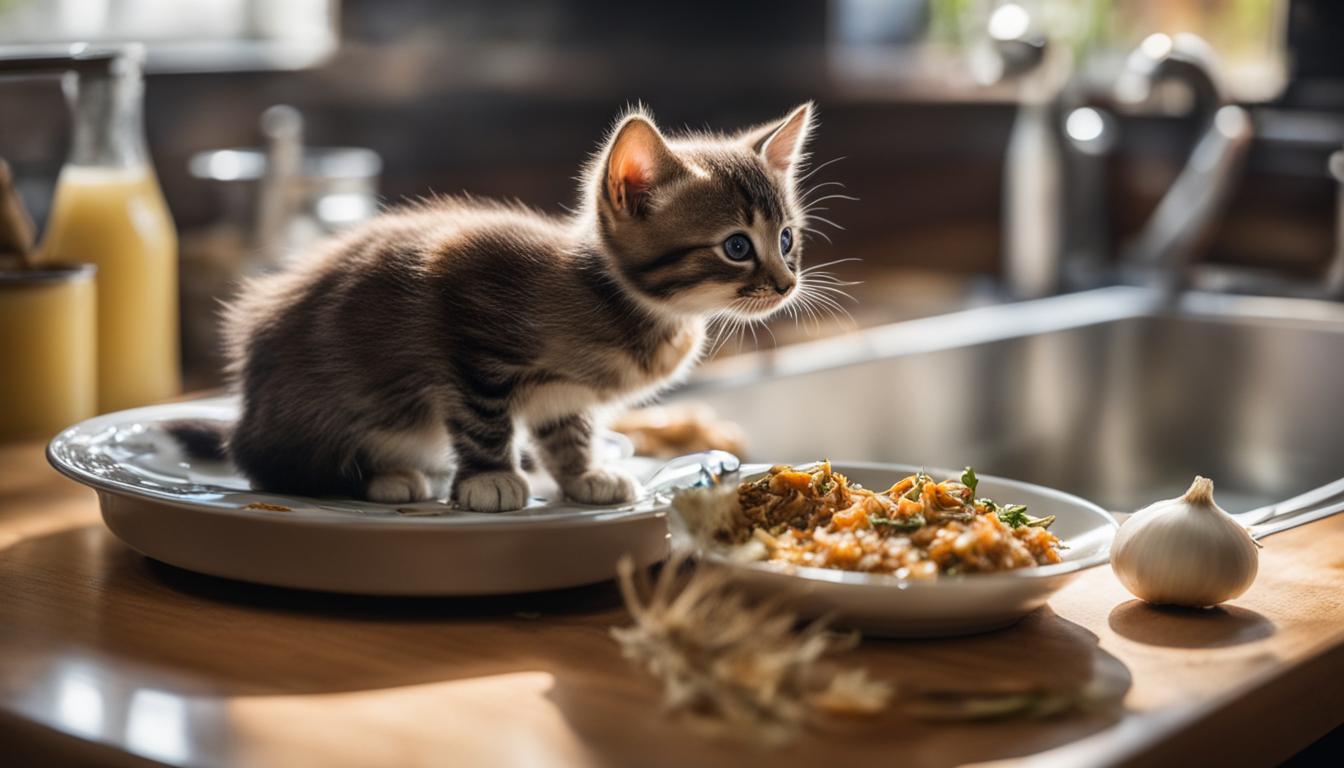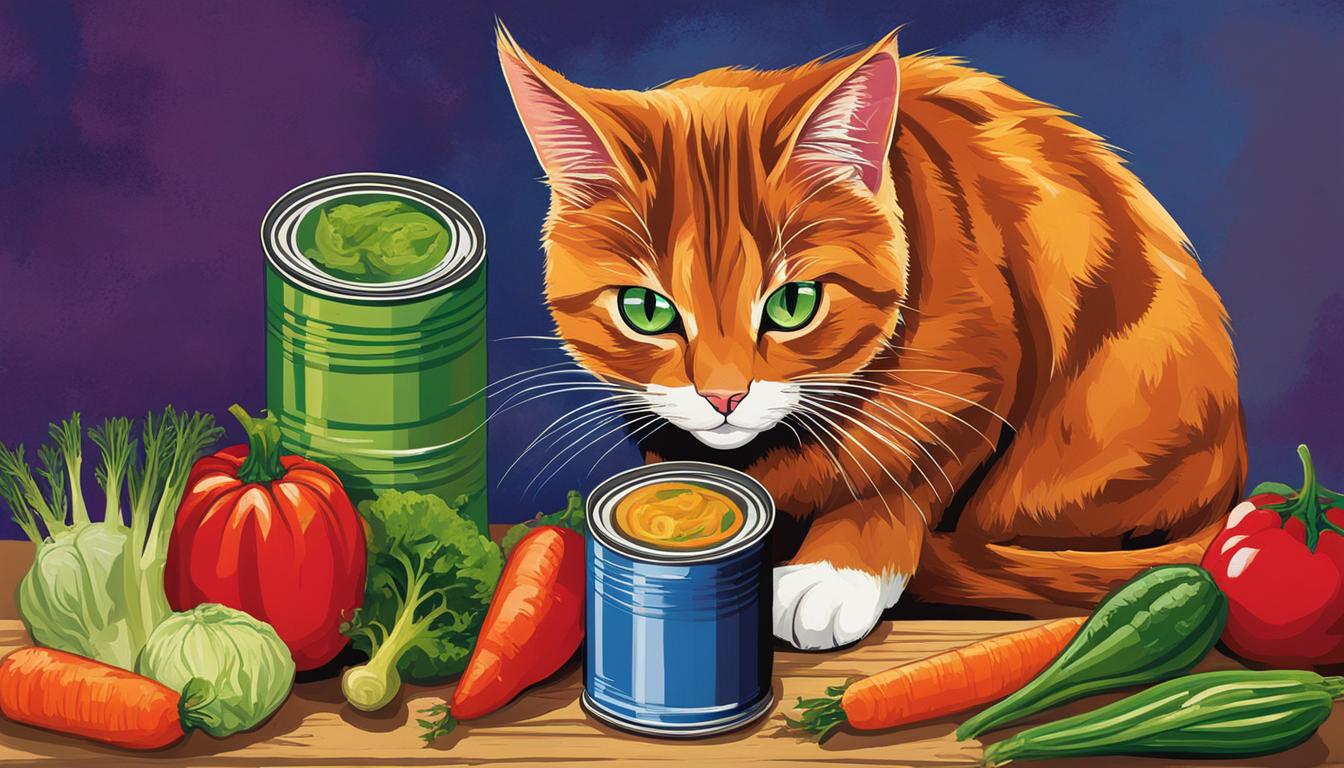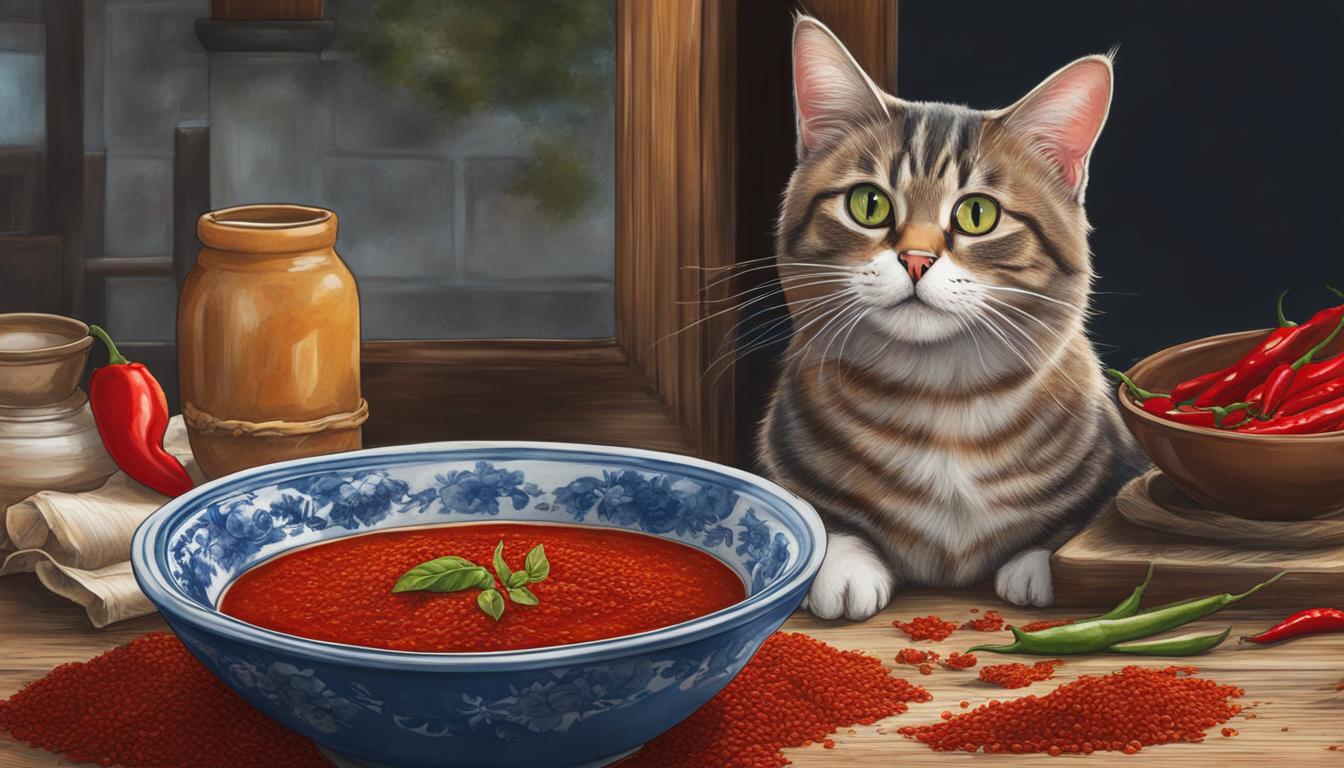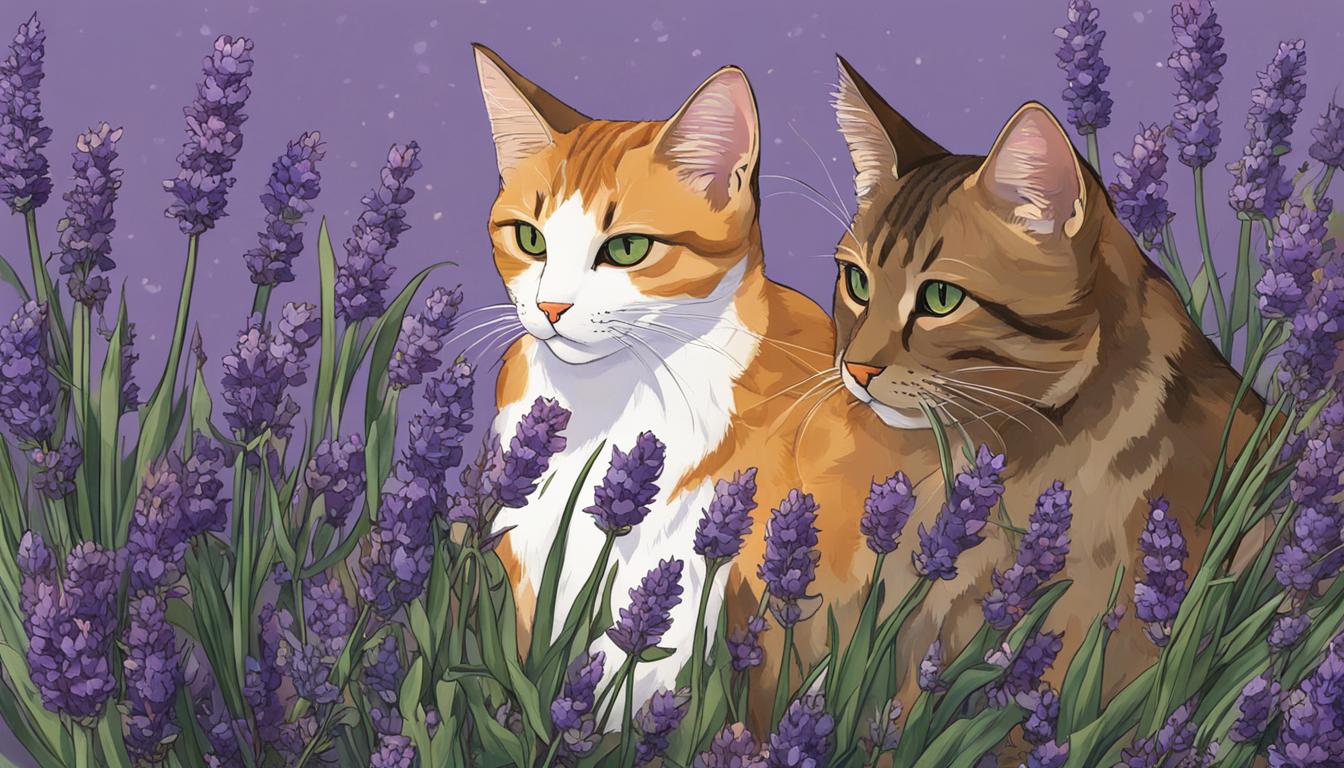Hey there! Today, I want to delve into a curious question that many cat owners have asked: can cats eat garlic and onions? As it turns out, these seemingly harmless foods can actually pose serious risks to our feline friends. So, let’s dig deeper and explore the effects of garlic on cat health and the toxicity of onions in cats.
Key Takeaways:
- Garlic and onions are toxic to cats and should never be included in their diet.
- The sulfur-containing compounds in garlic and onions can cause the destruction of red blood cells, leading to a deadly condition known as hemolytic anemia.
- Even a small amount of garlic or onions can have devastating effects on a cat’s health.
- It’s important for cat owners to be aware of the dangers and avoid feeding their pets garlic and onions.
- There are safe alternatives to garlic that can be used as flavorings for cats, such as cat-friendly herbs and spices.
Now, let’s dive into why garlic and onions are considered toxic for our beloved feline companions. Stay tuned!
Why Garlic and Onions Are Toxic for Cats
Garlic and onions contain sulfur-containing compounds that can be highly toxic to cats. These compounds, such as n-propyl disulfide and thiosulphate, can cause the destruction of red blood cells in cats, leading to a condition known as hemolytic anemia. When cats ingest garlic or onions, the sulfur compounds are activated, causing the red blood cells to become fragile and burst. As a result, cats can experience a range of symptoms and serious health consequences.
The severity of the toxicity depends on the amount of garlic or onions ingested, with even small amounts having potential harmful effects. A single clove of garlic or 1/8 teaspoon of garlic powder can already pose a risk to a cat’s health. The symptoms of garlic and onion toxicity in felines may include drooling, oral irritation, pale gums, vomiting, diarrhea, discolored urine, lethargy, and weakness. These symptoms may take several days to appear after ingestion.
It is crucial for cat owners to be aware of these symptoms and seek veterinary care promptly if they suspect their cat has ingested garlic or onions. The veterinarian may perform tests to determine the cat’s red blood cell levels and provide appropriate treatment, which may include supportive care, such as intravenous fluids or oxygen therapy. In severe cases, blood transfusions may be necessary to help the cat recover from anemia caused by garlic or onion poisoning. Immediate veterinary care is vital for the best chance of a successful outcome.
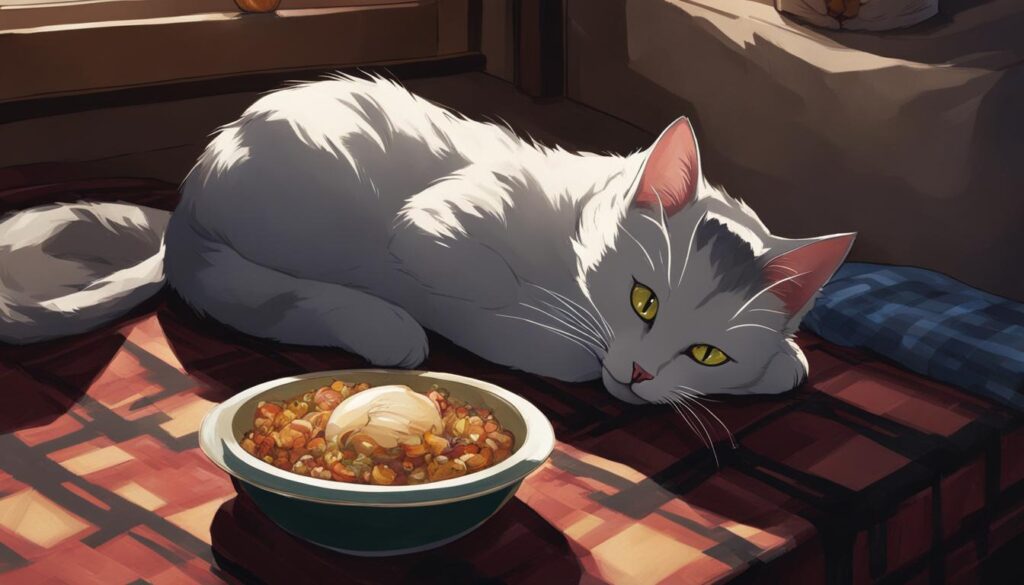
| Symptom | Description |
|---|---|
| Drooling | Excessive saliva production or slobbering |
| Oral irritation | Discomfort or inflammation in the mouth |
| Pale gums | Gums appearing lighter in color than usual |
| Vomiting | Forceful expulsion of stomach contents through the mouth |
| Diarrhea | Loose or watery stool |
| Discolored urine | Urine appearing darker in color |
| Lethargy | Tiredness, lack of energy, or decreased activity level |
| Weakness | Reduced strength or difficulty in moving |
The Allium Family and Its Toxicity to Cats
While it’s well-known that garlic and onions are toxic to cats, it’s important to note that other members of the allium family can also pose a risk to our feline friends. Shallots, leeks, chives, and scallions contain the same sulfur-containing compounds that can cause the destruction of red blood cells in cats. These vegetables are often used in a variety of dishes, such as salads, casseroles, and garnishes, making it essential for cat owners to be cautious about what their pets have access to.
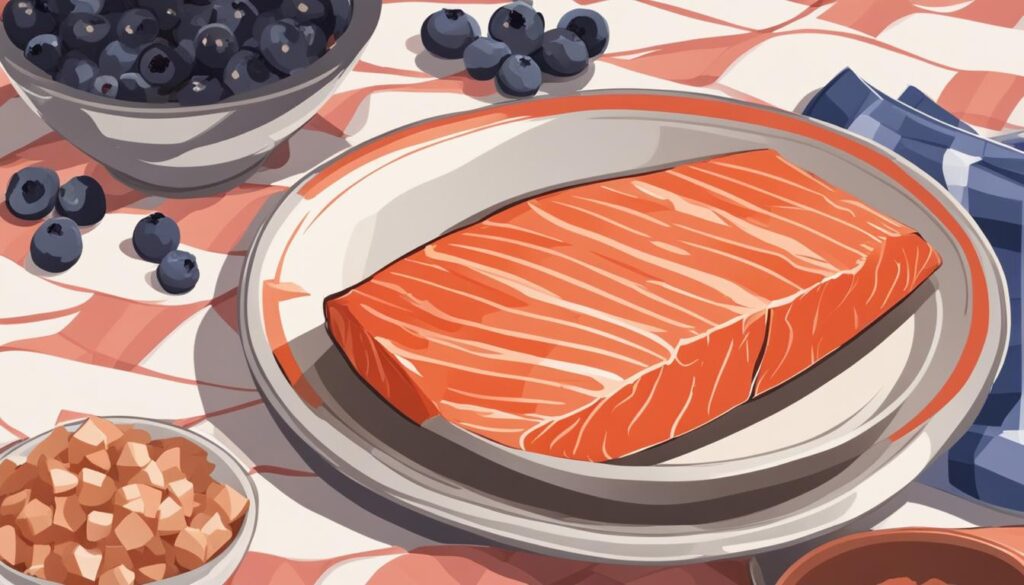
To ensure the safety and well-being of our cats, it’s crucial to avoid feeding them any food that contains these toxic vegetables. While garlic and onions can add flavor to our meals, there are safe alternatives that we can use when it comes to our feline companions. Cat-friendly herbs and spices, such as parsley or catnip, can be used as flavorings to enhance the taste of their food while keeping them safe from harm.
To better understand the dangers of the allium family, let’s take a look at a table comparing the toxicity levels of different members:
| Allium Vegetable | Toxicity Level |
|---|---|
| Garlic | High |
| Onion | High |
| Shallots | High |
| Leeks | High |
| Chives | High |
| Scallions | High |
As we can see from the table, all members of the allium family have a high toxicity level for cats. It’s crucial to be mindful of this and ensure that our furry friends are not exposed to these harmful substances. By making informed choices and being aware of safe alternatives, we can protect our cats and keep them healthy and happy.
What to Do If Your Cat Ingests Garlic or Onions
Cats are highly sensitive to the toxic effects of garlic and onions. If you suspect that your cat has ingested either of these substances, it is crucial to take immediate action to ensure your pet’s well-being. Here are some steps you can follow if your cat ingests garlic or onions:
- Contact a Veterinarian: Reach out to your veterinarian or the ASPCA Animal Poison Control Center for professional guidance. They can provide life-saving advice tailored to your cat’s specific situation.
- Do Not Induce Vomiting: Unlike some other toxins, inducing vomiting in cats at home is not safe. It’s best to follow the advice of a veterinary professional to avoid causing further harm.
- Seek Veterinary Care: In most cases, a visit to the vet is necessary if your cat has ingested garlic or onions. The vet may perform tests to assess your cat’s red blood cell levels and provide appropriate treatment.
- Supportive Care: Depending on the severity of the ingestion, your cat may require supportive care such as intravenous (IV) fluids or oxygen therapy. In severe cases, blood transfusions may be necessary to help your cat recover from anemia.
Remember, it’s vital to keep garlic and onion-containing foods out of your cat’s reach to prevent accidental ingestion. Always be vigilant when checking ingredient labels, especially in packaged or homemade foods.
Here’s a helpful table summarizing the steps to take if your cat ingests garlic or onions:
| Action Steps | Details |
|---|---|
| Contact a Veterinarian | Reach out to a professional for guidance |
| Do Not Induce Vomiting | Seek professional advice instead |
| Seek Veterinary Care | Visit a veterinarian for assessment and treatment |
| Supportive Care | Follow vet’s instructions for supportive treatments |
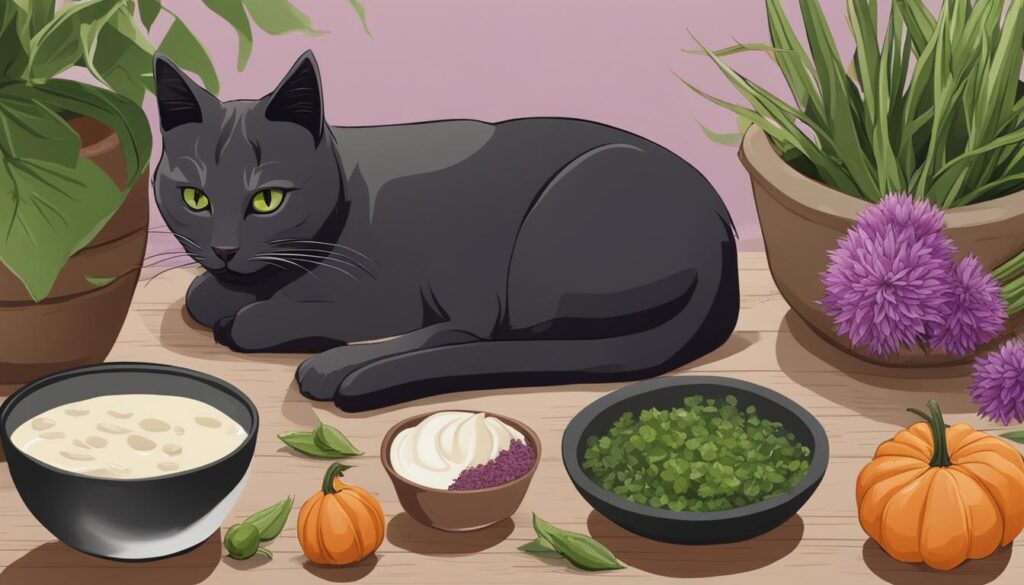
Seek immediate veterinary care if your cat ingests garlic or onions. Early intervention can significantly improve their chances of recovery.
Other Toxic Foods to Avoid
In addition to garlic and onions, there are several other foods that can be toxic to cats. It’s important for cat owners to be aware of these dangers and take necessary precautions to keep their pets safe. Some of the common toxic foods for cats include:
- Alcohol: Cats are highly sensitive to alcohol, and even a small amount can cause severe liver damage and neurological problems.
- Chocolate: Chocolate contains theobromine, which is toxic to cats and can cause symptoms like vomiting, diarrhea, rapid breathing, and seizures.
- Caffeine: Caffeine in coffee, tea, energy drinks, and chocolate can cause restlessness, rapid breathing, muscle tremors, and even cardiac arrhythmia in cats.
- Dairy products: Many cats are lactose intolerant, and consuming dairy products can lead to digestive upset and diarrhea.
- Fat trimmings: Feeding cats fatty foods like bacon or fatty meat trimmings can cause pancreatitis, a painful inflammation of the pancreas.
- Raw meat, eggs, and fish: Raw meat, eggs, and fish can contain harmful bacteria like Salmonella or E. coli, which can cause food poisoning in cats.
- Baby food: Baby food often contains onion powder, which is toxic to cats, and other ingredients that may not be suitable for feline consumption.
- Tuna intended for human consumption: While small amounts of canned tuna may be fine as an occasional treat, regular consumption can lead to malnutrition and other health issues in cats.
It’s crucial to read food labels carefully and keep these toxic foods out of your cat’s reach. Accidental ingestion of these substances can have severe consequences on your cat’s health. If you suspect that your cat has ingested any of these toxic foods or is showing symptoms of poisoning, it’s essential to seek immediate veterinary care for appropriate diagnosis and treatment.
| Foods to Avoid | Symptoms |
|---|---|
| Alcohol | Vomiting, diarrhea, coordination problems, coma |
| Chocolate | Vomiting, diarrhea, rapid breathing, increased heart rate |
| Caffeine | Restlessness, rapid breathing, muscle tremors, cardiac arrhythmia |
| Dairy products | Digestive upset, diarrhea |
| Fat trimmings | Pancreatitis, abdominal pain, vomiting |
| Raw meat, eggs, and fish | Food poisoning, vomiting, diarrhea, dehydration |
| Baby food | Onion toxicity, digestive upset |
| Tuna intended for human consumption | Malnutrition, mercury poisoning |
“It’s crucial to read food labels carefully and keep these toxic foods out of your cat’s reach.”
By being aware of these toxic foods and taking the necessary precautions, you can ensure the health and well-being of your feline companion. If you have any concerns or questions about your cat’s diet, it’s always best to consult with your veterinarian for professional advice.
Conclusion
So, we’ve learned that garlic and onions are a big no-no for our feline friends. These seemingly harmless ingredients can wreak havoc on a cat’s health, causing severe damage to their red blood cells and putting their lives at risk. But fear not, fellow cat lovers! There are safe alternatives to garlic that can satisfy your cat’s taste buds without compromising their well-being.
Safe Alternatives to Garlic for Cats
Instead of seasoning your cat’s food with garlic, consider using cat-friendly herbs and spices. Cats have a unique palate, and certain herbs like parsley or catnip can add flavor to their meals without any harmful effects. Not only do these alternatives provide a tasty twist, but they also ensure your cat stays safe and healthy.
Natural Remedies for Garlic Ingestion in Cats
If your sneaky little furball manages to snatch a bite of garlic behind your back, don’t panic just yet. There are a few natural remedies you can try to help mitigate the effects of garlic ingestion. Adding a small amount of activated charcoal to your cat’s diet can aid in removing toxins from their system. Additionally, providing plenty of fresh water and encouraging them to stay hydrated can help flush out any remaining garlic compounds.
Remember: Prevention is key, but accidents happen. Keep a watchful eye on your cat’s diet and ensure they are only consuming safe and cat-friendly foods. If you suspect your cat has ingested garlic or onions, seek immediate veterinary care for proper diagnosis and treatment. After all, it’s better to be safe than sorry when it comes to our furry companions!
FAQ
Can cats eat garlic and onions?
No, cats should never eat garlic or onions as they are highly toxic to their health.
What are the risks of garlic and onions for cats?
Garlic and onions contain sulfur-containing compounds that can cause the destruction of red blood cells in cats, leading to a life-threatening condition known as hemolytic anemia.
How much garlic is toxic to cats?
Even a small amount of garlic (approximately one clove or 1/8 teaspoon of garlic powder) can have devastating effects on a cat’s health.
What are the symptoms of onion poisoning in cats?
Symptoms of onion poisoning in cats may include drooling, oral irritation, pale gums, vomiting, diarrhea, discolored urine, lethargy, and weakness.
Are there safe alternatives to garlic for cats?
Yes, cat-friendly herbs and spices like parsley or catnip can be used as flavorings for cats instead of garlic.
What should I do if my cat ingests garlic or onions?
If you suspect your cat has ingested garlic or onions, seek immediate veterinary care for proper diagnosis and treatment.
What other foods should I avoid feeding my cat?
Other toxic foods for cats include alcohol, chocolate, caffeine, dairy products, fat trimmings, raw meat, eggs, fish, baby food, and tuna intended for human consumption.
Can chives be safely fed to cats?
No, chives are a member of the allium family and contain the same toxic compounds as garlic and onions. They should be avoided.
Are there home remedies for onion poisoning in cats?
It is not safe to induce vomiting in cats at home. If your cat ingests onions, immediate veterinary care is necessary.
What are the symptoms of garlic toxicity in dogs and cats?
Symptoms of garlic toxicity in dogs and cats can include vomiting, diarrhea, pale gums, weakness, and rapid breathing.

